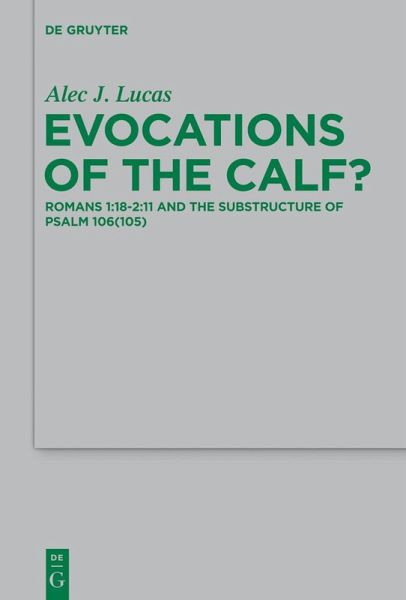
Evocations of the Calf? (eBook, ePUB)
Romans 1:18-2:11 and the Substructure of Psalm 106(105)
Versandkostenfrei!
Sofort per Download lieferbar
108,95 €
inkl. MwSt.
Weitere Ausgaben:

PAYBACK Punkte
54 °P sammeln!
This study proposes that both constitutively and rhetorically (through ironic, inferential, and indirect application), Ps 106(105) serves as the substructure for Paul's argumentation in Rom 1:18-2:11. Constitutively, Rom 1:18-32 hinges on the triadic interplay between "they (ex)changed" and "God gave them over," an interplay that creates a sin-retribution sequence with an a-ba-ba-b pattern. Both elements of this pattern derive from Ps 106(105):20, 41a respectively. Rhetorically, Paul ironically applies the psalmic language of idolatrous "(ex)change" and God's subsequent "giving-over" to Gent...
This study proposes that both constitutively and rhetorically (through ironic, inferential, and indirect application), Ps 106(105) serves as the substructure for Paul's argumentation in Rom 1:18-2:11. Constitutively, Rom 1:18-32 hinges on the triadic interplay between "they (ex)changed" and "God gave them over," an interplay that creates a sin-retribution sequence with an a-ba-ba-b pattern. Both elements of this pattern derive from Ps 106(105):20, 41a respectively. Rhetorically, Paul ironically applies the psalmic language of idolatrous "(ex)change" and God's subsequent "giving-over" to Gentiles. Aiding this ironic application is that Paul has cast his argument in the mold of Hellenistic Jewish polemic against Gentile idolatry and immorality, similar to Wis 13-15. In Rom 2:1-4, however, Paul inferentially incorporates a hypocritical Jewish interlocutor into the preceding sequence through the charge of doing the "same," a charge that recalls Israel's sins recounted in Ps 106(105). This incorporation then gives way to an indirect application of Ps 106(105):23, by means of an allusion to Deut 9-10 in Rom 2:5-11. Secondarily, this study suggests that Paul's argumentation exploits an intra-Jewish debate in which evocations of the golden calf figured prominently.
Dieser Download kann aus rechtlichen Gründen nur mit Rechnungsadresse in A, B, BG, CY, CZ, D, DK, EW, E, FIN, F, GR, HR, H, IRL, I, LT, L, LR, M, NL, PL, P, R, S, SLO, SK ausgeliefert werden.



